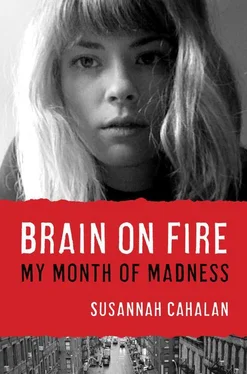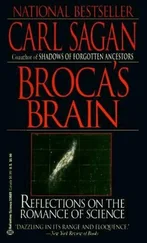Recently, as Stephen and I were watching TV in our Jersey City apartment, out of the corner of my eye I saw something move on the floor.
“Did you see that?” I asked Stephen.
“See what?”
“Nothing.” Am I going crazy again? Is this how it’s going to happen?
Then I saw it again. This time, Stephen grabbed his shoe and squashed the two-inch-long water bug.
I live with this fear. It does not control me or hinder my resolve, but I do live with it. The friends and relatives I interviewed would never have used the term skittish to describe me, but every now and then, when I’m on the subway and the colors seem brighter than normal, I think, Is it the lighting, or am I going crazy again?
And what about the subtler changes that cannot be touched or easily identified? I asked Stephen if he thought I was different now. Am I suffering from cognitive defects of which I am unaware? After a moment, he shook his head, “No, I don’t think so.” But he seemed uncertain.
Those closest to me had undoubtedly changed as I did, if not even more so. Stephen, who was once always so laid back, had become a worrier, especially when it came to me.
“Do you have your phone? How long will you be gone? Call me the minute you leave,” he would often repeat, calling and texting me over and over if I went just a few minutes without answering my phone.
For a long time after the hospital, Stephen saw me as a piece of fine and fragile china that could easily break, and he continued as my protector against the cracks and fissures of the real world. Though I’m eternally grateful for this, sometimes it became exasperating when he couldn’t give up that role. How could you blame him? But I did. Accepting this type of nannying was completely outside my personality, normally so self-reliant and obtusely independent. So, perversely, I would battle him, staying out late without calling and pushing his buttons about his constant check-ins. It was only when I started acting like an adult that Stephen started to treat me like one, and slowly we became equals again, evolving into a healthy relationship so different from the caregiver-patient relationship that had been formed under the harsh lights of the hospital room. But of course he still worries, and I doubt this will ever change. His thoughts often return to that night at my Hell’s Kitchen apartment, where my eyes rolled back in my head and my body stiffened, and both of our lives changed forever.
Yet some things haven’t changed. My parents, who had briefly been able to put aside their deep-seated animosity during my hospital stay, weren’t able to maintain their civil relationship after I had returned to myself. Without doctor appointments keeping them in contact, they fell back into the routine of habitual avoidance that even their daughter’s near-death experience couldn’t mend.
People never change, they say. I remember when I was entering sixth grade and the guidance counselor called us into her office to talk about the transition from elementary school to middle school. She asked me to pick an emoticon out of a list of about fifty to describe how I felt on the first day of school. I picked “ecstatic,” the one with the wide-mouthed, full laugh. The counselor was surprised by my pick; this apparently was not a common choice. I had been ecstatic then, but would I pick ecstatic now? Or have I lost that spark after all? Is there a sliver of me that did not recover from the fire?
The impostor EEG nurse, the sea of paparazzi surrounding my father at the top of the news hour, the insult silently hurled at me by my stepfather. These absurd memories persist, while others that are real and documented fall through the fingers of my mind like water. If all I remember are hallucinations, how can I rely on my own mind?
To this day, I struggle with distinguishing fact from fiction. I even asked my mother if Allen had actually called me a slut in the car that day.
“Are you kidding?” my mom asked, hurt that I could even ask. “He would never do that.”
She was right; logically, I understood he would never say such things. Yet why did I continue to believe my own bizarre memory over a lifetime of proof? And why did these specific memories remain intact? If I didn’t have a mental illness, how did these hallucinations come about?
Though hallucinations, paranoia, and an illusory grasp on reality are the hallmarks of those with schizophrenia, you don’t need to suffer from a mental illness to induce these symptoms. In 2010, a Cambridge University study helped to illuminate the thought processes of people with schizophrenia by injecting healthy student volunteers with the drug ketamine—which blocks the same NMDA receptors in the brain that were affected by my illness—and conducting what is known as the “rubber hand illusion” on them. 61Fifteen students were asked to place one hand on a table beside a fake rubber hand, first after they had been injected with ketamine and then at a later sitting with a placebo. During the experiment, the real hand was hidden from view as two paintbrushes, attached to motors, stroked the index fingers of both hands. Though subjects on a placebo could also be tricked by the illusion, those on ketamine sooner and more intensely believed that the rubber hand was their own. The experiment showed that the ketamine injections, for whatever reason, helped break down the subjects’ sense of reality, making things that would ordinarily seem impossible to a rational mind, like having the ability to age someone with your mind, suddenly seem possible.
There have been decades of research, like the rubber hand study, on the phenomenon, yet hallucinations continue to intrigue researchers, and there’s still no consensus about their basic mechanisms and why they exist.
All we know is that they occur when the brain perceives an outward sensation—vision, sound, or touch—but there is no corresponding external source; it is a failure to distinguish between what is external and what is internal, referred to as self-monitoring theory. 62
In the same vein, it is precisely because these hallucinations are self-generated that they are so believable and vividly remembered, explained psychology professor Dr. Philip Harvey. It’s called the generation effect: 63“Because those hallucinations were self-generated,” Dr. Harvey told me, “you were better able to remember them.”
Although people with schizophrenia exhibit cognitive and memory defects, they can remember just as well as healthy people if they are forced to structure the memory themselves. For example, those with schizophrenia best remember lists of words when they are asked to make a story out of the words rather than straightforward and unaided remembering.
Couple this with the fact that these head trips were intensely emotional and would therefore be tagged as important by the hippocampus and amygdala, both of which were affected by my disease. The amygdala, an almond-shaped structure situated atop the hippocampus, located at the sides of the head above the ears in the temporal lobes, is a structure intimately involved in emotion and memory, helping to choose which memories should be kept and which should be discarded, based on which events have traumatized or excited us. 64The hippocampus tags the memory with context (the hospital room and the purple lady, for example), and the amygdala provides the emotion (fear, excitement, and pain).
When the amygdala stamps the experience with high emotional value, it’s more likely to be preserved, a process called encoding, and eventually made into a memory, called consolidation. The hippocampus and amygdala help encode and consolidate the experience, or make it into a memory that can be retrieved later. 65When any part of this elaborate system is compromised, the memory may not be formed.
Читать дальше












